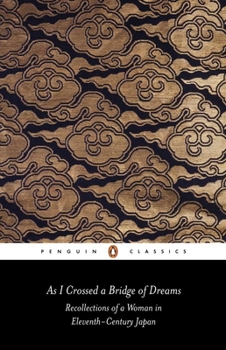As I Crossed a Bridge of Dreams: Recollections of a Woman in Eleventh-Century Japan
Select Format
Select Condition 
Book Overview
Born at the height of the Heian period, the pseudonymous Lady Sarashina reveals much about the Japanese literary tradition in this haunting self-portrait. Born in 1008, Lady Sarashina was a lady-in-waiting of Heian-period Japan. Her work stands out for its descriptions of her travels and pilgrimages and is unique in the literature of the period, as well as one of the first in the genre of travel writing. For more than seventy years, Penguin...
Format:Paperback
Language:English
ISBN:0140442820
ISBN13:9780140442823
Release Date:December 1989
Publisher:Penguin Group
Length:176 Pages
Weight:1.05 lbs.
Dimensions:0.5" x 5.0" x 7.7"
Age Range:18 years and up
Grade Range:Postsecondary and higher
Customer Reviews
4 ratings
A Memoir of the Dreams of Life
Published by Thriftbooks.com User , 19 years ago
This lovely poetic lament transcends time and space. How often does a glimpse of the forbidden (that which lies beyond our cloistered grasp) create a melancholia that pervades our life? As we cross this bridge of dreams - fleeting and ethereal, we identify with Lady "Sarashina" and a life of desires destined to remain unfulfilled. And yet, it is precisely this unfulfillment that allows the memoirs' moody passion to blossom. As a result of her discontent, we readers have an opportunity to savour the gentle nectar of her often luminous writing.
The Sei Shonogon antipode
Published by Thriftbooks.com User , 19 years ago
Lady Sharashina lived a life of dreamy lament. It is a wonder if someone of her nature could ever be happy with what the real world could offer. Her brief moments of happiness are gained in dreams and fantasy, or tempting/dreaming the impossible, the forbidden fruit. The real world, despite living a life of relative privilege, was a never ending experience of pain to her. She took seeing the ephemeral (wabi sabi/mono no aware) aspects of life to heiights of seeing the eternal in the ephemeral the great in the small, which can be beautiful (as with Basho), but Lady Sharshina seems too idealistic and self obsessed which makes it something pitiful in the end. The real world is one of duty and lament: "veni, vedi, vici" would not be her epitaph; more like perpetual nostaligic anguish and shyness. Her regrets seem misguided. Lady Sharashina avoided popular attractions, as opposed to her near contemporary Sei Shonagon, in "The Pillow Book", who endeavored to be the attraction. Some of the scenes are unforgetable and the book is a classic for what it is: the memoirs of a dreamer. The book has one of the most poignent poetic conundrum sort of endings I can recall. The translation failed to capture all of the poems, which is to be expected; but those that were captured are brilliant. The contrast between Sei Shonagon and Lady Sharshina is one of the beauties of these books and poses an interesting psychological comparison.
Lyrical counterpoint to Sei Shonagon
Published by Thriftbooks.com User , 20 years ago
Short, poignant and redolent of a very individual experience of life in Heian Japan, the memoirs of 'Lady Sarashina' provide a fascinating glimpse of a woman's life slightly outside of the most exalted circles of eleventh-century life. This is a highly idiosyncratic portrait of its time, concentrating on episodes important to Sarashina herself (dreams, pilgrimages, poetic exchanges) rather than to the politically-active class as a whole. The sense of chronology is vague, the structure dictated more by mood pieces and observations than straightforward diary-keeping. As such, this probably isn't the place to start with medieval Japanese writing, but something to try after Sei Shonagon (an altogether more ebullient and resilient character, who _is_ at the centre of things) and Lady Murasaki. Sarashina is too withdrawn to involve herself in the customary court intrigues and liaisons, and too low-status to have much impact. Instead, she occupies herself with the fantastical world of Genji and other "Tales". Her memoirs are also notable for their account of a journey through the provinces to the capital, and for highly-praised poetry that unfortunately doesn't translate particularly well. Ivan Morris' concise introduction sets the work in its context and discusses its significance and textual history; line drawings and unobtrusive notes further build our picture of Sarashina's world. A worthwhile purchase.
This is a very sensitive recollection of a delicate woman
Published by Thriftbooks.com User , 25 years ago
Sarashina Nikki is a very sensitive recollection of a delicate woman. Lady Sarashina provides us a window into the life of a woman who was not the life of the party as Sei Shonagon, a great scholar as Murasaki Shikibu or a passionate lover as Ono no Komachi. Instead, this book will give you a look into the life of a deeply sensitive creature who ,perhaps, never got the recognition she deserved.




